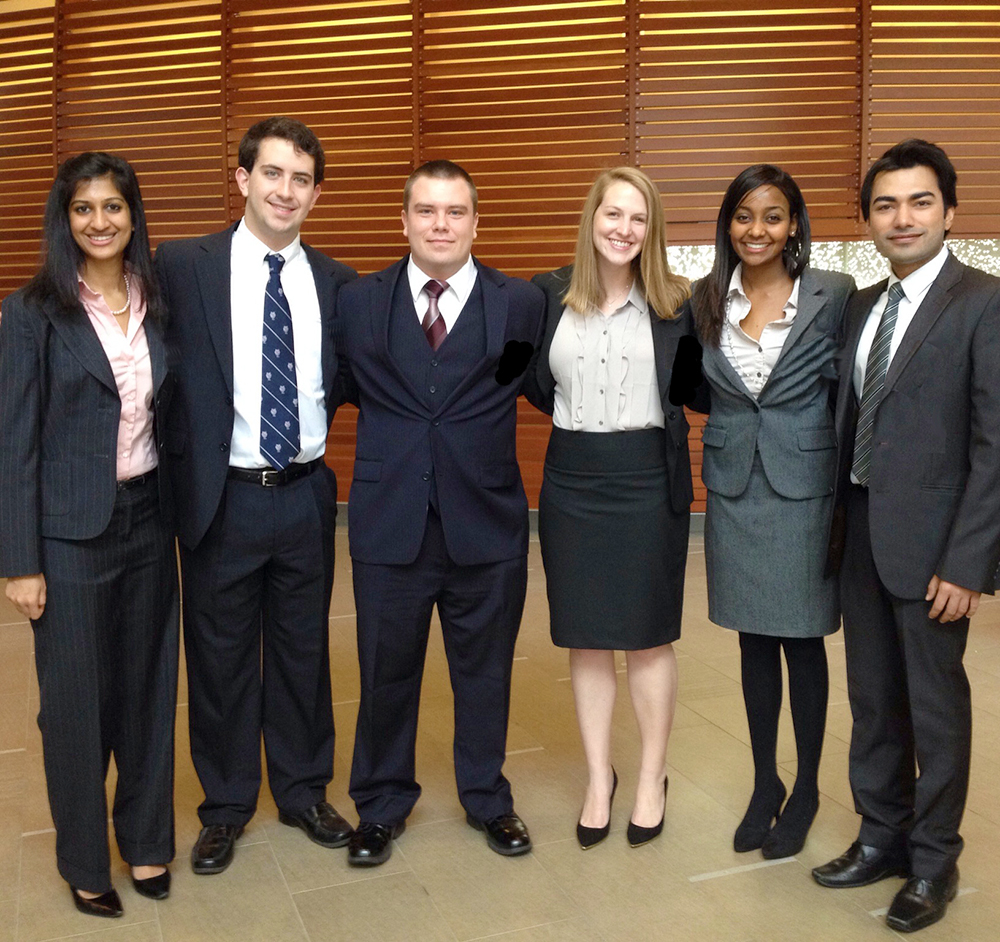
A team of UT System students placed first at the International Emory Global Health Case Competition. From left: Team members Kajal Mehta and Jack Squiers, UT Southwestern Medical School; Jonathan Stringer, UT Arlington; Jane Slusher, UT Dallas; Luwam Ghidei, UT Southwestern; and Rohit Tyagi, UT Dallas.
Rohit Tyagi and Jane Slusher, MBA students from the Naveen Jindal School of Management, recently teamed up with other UT System students in a competition to solve a global health issue. The team placed first against an international field at the annual International Emory Global Health Case Competition.
The Jindal School students joined three peers from UT Southwestern Medical School and an engineering student from UT Arlington at the competition that focuses on worldwide health-related cases that require an interdisciplinary solution.
Nearly 140 students from 24 universities representing the United States, Australia, Canada and Sweden competed. They were charged with reorganizing the World Health Organization (WHO) by redefining its purpose and role in addressing global health issues in the 21st century.
The UT System team earned first place and $6,000 for its reformation plan — Leaders Enabling Efficient Approaches Through Partners and Priorities (LEAPP). The team also won the Participants’ Choice Award for making the best presentation at the event, which was voted on by all competitors. A team from Johns Hopkins University placed second, and a team from the University of Alberta placed third.
“This was such an unusual case competition in that it included (UT System) students from three different schools, three different areas of study,” said Lisa Shatz, JSOM assistant dean for MBA programs. “It was a great opportunity for business students to represent how the problem-solving skills taught in business school can be applied to any issue — in this case the World Health Organization.”
“This was such an unusual case competition in that it included (UT System) students from three different schools. It was a great opportunity for business students to represent how the problem-solving skills taught in business school can be applied to any issue — in this case the World Health Organization.”
Lisa Shatz,
Jindal School assistant dean for MBA programs
The team developed a plan for WHO's mission, recommending the organization change from running a “boots on the ground” operation to becoming a global facilitator.
“We felt their real core competency wasn’t that they administer vaccines but rather that they have a global network to help organizations,” Slusher said.
For funding issues caused by earmarking, “we told them to replicate the academic model,” Tyagi said. “Tell donors upfront that a certain percentage of donated money will be reserved for general, uncommitted use and increase that percentage over time.”
Organizationally, LEAPP recommended phasing out autonomous internal groups while getting more buy-in from external faith-based, nongovernmental and private stakeholders.
According to Slusher and Tyagi, the UT System team’s attention to detail and its dramatic face-to-face appeal made the winning difference.
"We were the only team that whatever the judges asked, we had the answer,” Tyagi said.
The final round of the competition presented the team with a twist — political criticism that WHO is too focused on Western ideals and too Westernized.
Recalling successful joint U.S.-Russian efforts — such as fighting the polio pandemic — Slusher made a direct appeal to a man portraying the president of Russia.
“If you don’t belong to organizations like this, you’re going to discount your population from global health. So, Russia, take a leap with us,” she said to the "pretend Putin."
She then addressed everyone and said, “Take a leap with us.” It's a moment Slusher described as moving.
Tyagi, a spring graduate who is working in a risk assurance job at the Houston office of PricewaterhouseCoopers, said the global perspective of the competition attracted him. “I would say I have a fierce interest in world politics,” he said.
Slusher worked for a patient advocacy company before pursuing her MBA and is focusing her studies on a career in health care management. Initially, she worried the competition would hinge on medical issues and answers. “When we got this case, I was actually a little relieved. I was like, organizational structure I can do. So I think having a team that had MBA students on it for this specific problem was awesome.”